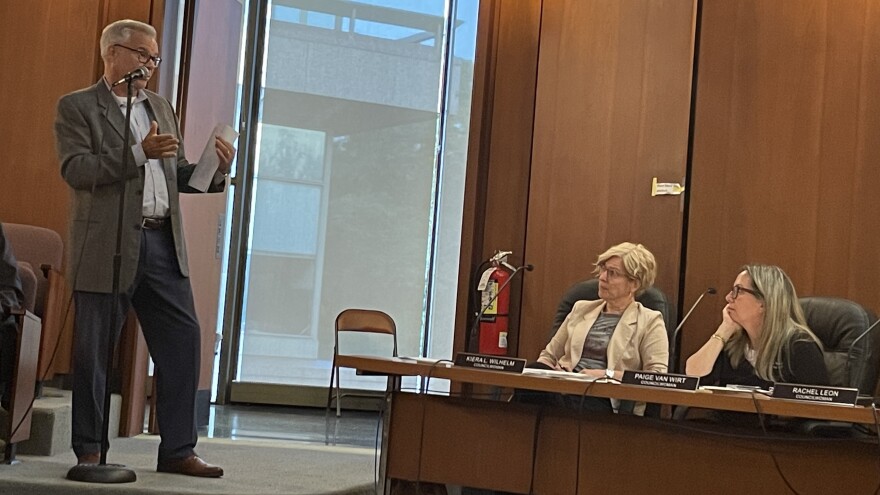BETHLEHEM, Pa. — A daily increase in organic waste heading to the Bethlehem Wastewater Treatment Plant sparked a special study and planning process from city staff that determined improvements could bump its daily organic capacity 21%, according to a city official.
The study summary states those upgrades, which would raise the capacity from 39,365 pounds of waste a day to 50,000 pounds, would cost $1.4 million and maintain the current flow rate.
- Bethlehem officials are advising 12 other municipalities of planned wastewater plant upgrades
- Flow rate has remained consistent, but organic waste has increased, one official said
- The improvements would include $1.4 million to cover a chemically enhanced coagulant
The city Planning Commission on Thursday offered favorable comments for the proposed plan. It'll proceed at some point to City Council for comment.
The treatment plant, at 144 Shimersville Road, serves the city and 12 other municipalities: Hanover Township, Lehigh County and Hanover Township, Northampton County; Hellertown; Fountain Hill; Bethlehem Township; Freemansburg; Allentown; and Salisbury, Lower Saucon, Palmer, Lower Nazareth and East Allen townships.
Bethlehem Act 537 Special Study 5-30-23 by LVNewsdotcom on Scribd
A project summary states the $1.4 million in upgrades needed would include a 12,500-gallon, high-density linear polyethylene chemical storage tank with a chemical feed system.
That tank would feature a chemically enhanced primary treatment system that would act as a coagulant, according to city Water and Sewer Resources Director Edward Boscola.
“That organic matter binds together, becomes heavier,” Boscola said. “It drops into the bottom of the clarifier, where that organic matter gets pumped up to the digesters for treatment.”
The process also would let officials increase the overall rating of the plant by taking some of the load off the secondary treatment system, Boscola said.
'All about improving the efficiency'
That million-dollar option beat out an alternative described as part of the 2012 plan: liquid train improvements that would cost $38 million in 2023, the project summary reads.
“It’s all about improving the efficiency of that equipment that we have so we can treat more organic waste.”Edward Boscola, Bethlehem director of water and sewer resources
Commission member Joy Cohen asked whether the new equipment would positively affect operations while also bringing down costs. Boscola said that would definitely be the case.
“It’s all about improving the efficiency of that equipment that we have so we can treat more organic waste,” Boscola said.
He also said it ultimately would improve the quality of water that ends up sent to the Lehigh River.

Increased organic waste
Boscola said officials have kept an eye on two primary rating numbers at the plant: hydraulic flow rate and organic treatment capacity.
He said that even though the facility is rated for a flow of 20 million gallons per day, it’s currently averaging 12 million gallons per day — or about 60% of the rated capacity.
That hasn’t changed much in at least two decades, Boscola said.
Organic treatment capacity is measured in terms of biochemical oxygen demand, which describes the volume of organic waste coming into the plant, he said. That number has been going up.
“While the flow has been very steady, flat, the organic load has been increasing,” Boscola said.
He said the increase in organics is happening for a number of reasons, including greater use in residential kitchen garbage disposals, as well as high-strength industrial users operating within the service area — including Just Born Quality Confections, Freshpet and SunCup Juice.
Act 537
Act 537, part of the Pennsylvania Sewage Facilities Act, is a state law governing the planning and management of municipal wastewater treatment and collection systems.
The city’s current Act 537 plan was approved more than a decade ago, establishing a “20-year time horizon” out to about 2030, Boscola said.
That plan still is valid for the community, and the new review is strictly associated with the operation of the plant, he said.
Boscola said that since the plant and its collection system bring in sanitary waste from surrounding areas, the city’s plan review and its noted adjustments are needed to estimate growth in relation to changing populations and other factors.
“The act allows for municipalities to basically change course; these things are not etched in stone,” Boscola said. “You can modify them depending on what’s going on in the community or what’s going on in wastewater treatment.”
The planning process
Boscola said the state Department of Environmental Protection calls for the city to go through this planning process, which involves notifying contributing planning commissions and councils within the plant’s service area and taking their feedback.
Once officials approve their end of the plan, the report is compiled and sent to DEP for review, he said. He said he hoped to have that submitted to the state by the end of the year or early next year.
Appropriate personnel must currently hold a water quality management permit to install the new equipment, and a contractor has claimed a bid to handle the additions.
Lehigh Valley Planning Commission showed favorable comments for the plan, according to Bethlehem Director of Planning and Zoning Darlene Heller.


